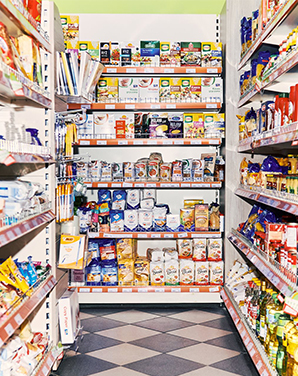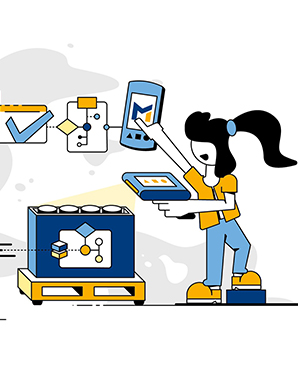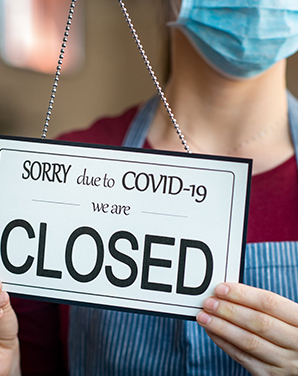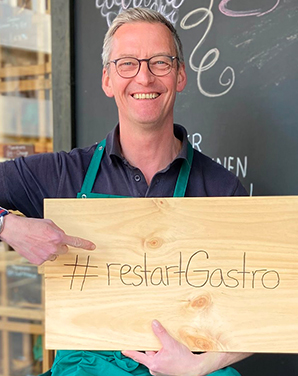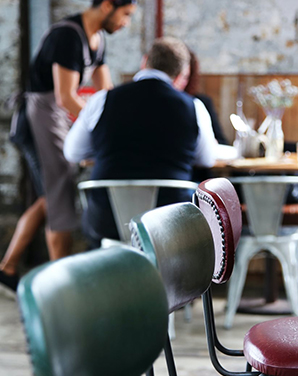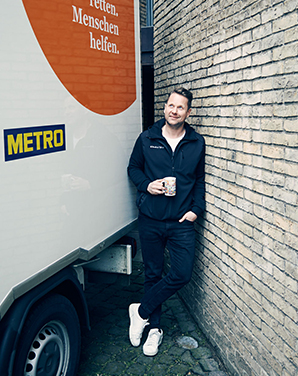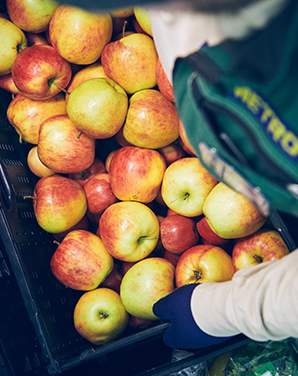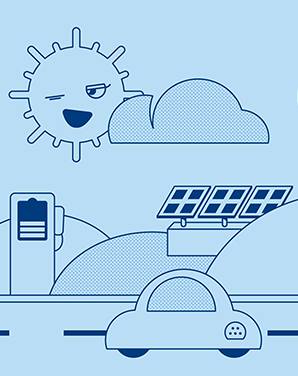Goals and strategy
METRO
- METRO successfully completes transformation to becoming a pure wholesaler.
- Continuation of the successful strategy with consistent implementation of the Wholesale 360 approach in order to position itself as the partner of choice for wholesale customers and in particular the core customer groups HoReCa and Traders.
- The current strategy forms the basis to emerge stronger from the crisis.
METRO is a leading international food wholesaler and global market leader in the cash-and-carry format. METRO is managed by METRO AG as the central strategic management holding company. Furthermore, central management and administrative functions are deeply enshrined within METRO AG.
The transformation of the group back to a pure wholesale company was completed with the successful sale of the Real sales line. METRO operates globally in more than 30 countries, including 24 countries with 678 wholesale stores under the METRO and MAKRO brands. The delivery business (Food Service Distribution, FSD) is also part of the wholesale segment, including the METRO delivery service and the companies specialised in delivery: Classic Fine Foods, Pro à Pro and Rungis Express.
Other business divisions, which essentially support the wholesale activities, are bundled in the Others segment. This particularly includes the group’s digitalisation initiatives. They mainly comprise the activities of the Hospitality Digital and METRO MARKETS business units. The segment also includes the real estate company METRO PROPERTIES as well as various service companies that provide services in the areas of logistics, information technology, advertising and procurement.
METRO’s strategy is aimed at long-term, consistent growth of sales and earnings. The wholesale business targets a very attractive industry sector that is characterised by very strong customer relationships (compared to food retail), a high number of returning customers, large shopping baskets and high productivity at significantly lower operating costs.
HoReCa and Traders focus
The 2 core customer groups of METRO are HoReCa and Traders. The HoReCa section includes hotels, restaurants, bars and cafés as well as catering companies, canteen operators and street food vendors. The Traders section includes, for example, small grocery stores, kiosks as well as petrol stations and other wholesalers. Both core customer groups have huge market potential, which we believe is based on the following factors, among others. On the one hand, both customer groups have an attractive, continuously growing market size; on the other hand, the number of prospective customers is very high due to the local competition between many (independent) providers on the HoReCa and Traders markets. A third group of customers are Service Companies and Offices (SCO).
Portfolio and market consolidation
In the core customer groups HoReCa and Traders, METRO aims to play a leading role as a product and service provider, depending on local market conditions. METRO combines an extensive network of modern wholesale stores with delivery business and digital services such as a system for ordering meals. The country portfolio of METRO is divided into core customer groups and regions, and is regularly reviewed with regard to the feasibility of a local market leadership and the attractiveness of the respective markets. Accordingly, possible portfolio adjustments of METRO adhere to strict implementation of the strategy to achieve a leading role in the respective market. On the one hand, this can be done through acquisitions for further market consolidation, but on the other hand it does not rule out market exits for portfolio simplification.
Localisation via country-specific value creation plans
METRO consistently aligns its business model to customer value and strengthens its local organisations to establish a closer relationship with B2B customers. Depending on the main customer focus in the respective countries, METRO offers a product range that is tailored to the specific requirements of its customers. By tailoring METRO products, services and sales channels to local needs, we can exploit local market opportunities to their full potential.
Based on the business model, the national subsidiaries develop and implement their local strategies, which are then translated into individual value creation plans and enable growth according to local conditions. The central holding functions support local value creation, in particular by relieving administrative tasks. Based on the country-specific and locally generated value creation plans, METRO has identified significant strategic value enhancers for its wholesale business:
- METRO aims to leverage the full potential of the markets it serves across all core customer groups. This is accomplished by differentiating the wholesale stores, for example by designing stores that are specifically tailored to the different customer groups and their respective needs.
- We intend to further expand the delivery business because it is attractive and complements the core business of the wholesale stores. Delivery is the most important procurement channel for HoReCa customers in most countries.
- METRO has set the goal to further roll out the Trader Franchising Model in countries such as Poland, Romania and Russia. METRO operates in a similar way as a franchisor with its own brand identity. It provides products and offers additional services to the participating independent grocery stores, such as training courses and assortment consultancy. The expansion of the model helps open up new growth opportunities in relevant markets. We are also exploring strategic B2B partnerships with online food retailers to complement our Traders strategy. To date, METRO has already established partnerships in 5 countries and is conducting pilot projects in 4 other countries.
- We want to win over our customers through our explicit customer orientation. With the Net Promoter Score (NPS), METRO continuously measures customer satisfaction through frequent surveys on the shopping experience. We use the results of the customer surveys to further improve our customer value proposition. It includes in particular the design of our product range, including own brands tailored to the specific quality requirements of our professional customers, pricing geared to bulk consumers and a range of corresponding services. By offering customers training, further education and professional advice, METRO enables them to benefit from its know-how.
- We aim to increase our operating efficiency in order to reduce our cost base. To this end, the group-wide synergy potential should be exploited, for example by expanding joint purchasing in METRO countries. On the other hand, cost advantages are to be realised through strategic cooperation projects with international retail and wholesale companies, for example by reducing procurement costs through international purchasing alliances.
Wholesale 360
Building on the successful core business, METRO is expanding its business model within the framework of the strategic Wholesale 360 approach. Across all groups, the majority of METRO customers are small and medium-sized companies as well as sole traders. One objective of the Wholesale 360 approach is to strengthen the competitiveness of its customers – not only to make them and their business model more successful, but also with the aim of increasing customer retention over the long term and to become the preferred partner for HoReCa and Traders customers. Consequently, METRO assists its customers with their business challenges by providing them with sustainable solutions with superior added economic value, which we have combined under the Wholesale 360 approach.
To achieve this, METRO leverages its experience, knowledge, resources and global presence, which it has gained and succesfully expanded in more than 55 years since the first METRO store was opened in Germany. In addition, in a constantly changing environment, METRO identifies the current and future challenges of the customers at an early stage to offer them professional services and digital solutions. In doing so, we are pursuing the goal of expanding the customer relationship from a transactional merchandise trade to a sustainable and holistic partnership and thereby clearly differentiating ourselves from other wholesalers.
The Wholesale 360 approach is made up of 6 subject areas: expanded products, consulting, digital tools, marketplace, services and equipment.
- METRO’s core competence is to offer ultra-fresh, high-quality food at attractive prices, tailored to local needs. To this end, METRO’s national subsidiaries continuously develop their product range and adapt it to changes in order to increase customer satisfaction, shopping cart size and repurchase rates.
- Our customers are faced with a variety of complex challenges, for example, in the area of human and time resources, efficient business management, product range design or the financial resources of their companies. We offer individual top consulting, based on the know-how and experience of METRO. For this purpose, METRO invests in the consulting competence of the customer managers and uses the possibilities of data analysis. In the future market India, METRO and the Fintech company ePayLater developed the ‘Digital Shop’ app for kirana traders. With this app, sales can be efficiently tracked, inventories managed and payments processed digitally and free of charge.
- Access to digital solutions and innovative applications is a key subject area of our Wholesale 360 approach. The Hospitality Digital business unit offers customers from the hospitality industry convenient access to digital applications, such as free services for creating a website, online reservation systems or efficient staff management systems. Moreover, applications are available for optimising the respective operation, such as the MenuKit for automatic calculation of the cost of goods sold. These applications provide commercial added value for hospitality customers and will be used in a targeted manner in the future to expand existing customer relationships and to achieve an increase in new customers. Digitalisation represents an important strategic growth area and an investment into METRO’s future, and is consistently being implemented, in particular, by METRO-NOM, the group’s own IT subsidiary. METRO-NOM assists in the digital transformation of METRO and develops IT solutions for METRO and customer contact points. It includes, for example, the M-Shop customer platform and the METRO Companion shopping app.
- METRO MARKETS has been operating an online marketplace in Germany since September 2019, which targets HoReCa wholesale customers in particular. An international roll-out of the marketplace is being prepared.
- The range of services within the scope of the Wholesale 360 approach is continuously analysed, intensively worked on and optimised, as we expect it to provide noticeable growth impulses in the future. First, we are offering additional services such as financial services in selected countries.
- Modern equipment in the modern hospitality industry helps increase productivity and cut costs, while at the same time offering a high level of service quality. Strategic collaborations also enable integrated solutions, such as the offer of professional equipment at advantageous conditions. In cooperation with Pentagast, the largest association of resturant and kitchen equipment suppliers in Germany, we provide trend-setting food and kitchen solutions. METRO is thus expanding its product range and reaching further potential customers.
Covid-19
METRO is also affected by the global Covid-19 pandemic and its consequences. The pandemic poses enormous challenges for our business.
The hospitality industry, which experienced a very positive growth dynamic over the last decade, was and still is particularly restricted by Covid-19. This is primarily due to official restrictions imposed by the authorities to contain the pandemic. In the long term, the HoReCa sector is generally benefiting from the trend of increasing out-of-home consumption. The Traders customer group, which benefits from the continuing trend towards convenience solutions, was less affected by the restriction of business activities compared to the hospitality industry. In many cases, Traders as local suppliers in food retail were even able to benefit from the situation due to increased consumption at home.
So far, our diversified customer structure and multichannel approach have proven to be strengths and competitive advantages in the pandemic. Moreover, the pandemic is helping to accelerate the pace of digitalisation among our core customer groups, which is reflected in the increased demand and use of our digital solutions. In connection with the pandemic, we see an increased need for more advanced, situation-specific solutions, which we are analysing and offering as part of our Wholesale 360 approach.
National and regional authorities have responded with a wide range of measures to this pandemic, which to date has been characterised by outbreak patterns that vary significantly in terms of geography and time. Thanks to our locally based business model, we are in a position to deal with the respective situation appropriately. In order to make the best possible use of opportunities arising from the respective situation and to avert potential risks, we temporarily adjust the priorities in our country-specific value creation plans on a case-by-case basis to the benefit of our business.
Overall, our experience during the pandemic has so far confirmed our basic strategy. We are convinced that, thanks to our strategy, we will emerge even stronger from the pandemic.
Real estate
METRO has extensive real estate assets and manages a portfolio of more than 700 operating properties. The real estate sector makes a significant and long-term contribution to the business success of the wholesaler.
METRO PROPERTIES concentrates the real estate know-how of METRO and has established itself on the market as a reputable real estate company. The company operates, develops and markets an international portfolio of properties. Its activities cover the entire life cycle of METRO’s real estate assets: from future-oriented investments, economic property operation/maintenance to sustainable and creative development of real estate assets as well as the realisation of capital gains during disposal at the right point in time. In financial year 2019/20, the focus was on the successful disposal of real estate assets in connection with the sales transactions of METRO China and Real. METRO PROPERTIES is supporting the buyer of the real estate assets associated with Real for a transitional phase with a comprehensive, professional range of services. Together with our Chinese partner Wumei, initial talks were held about a joint project development, for example in Shanghai or Chongqing. The real estate portfolio was subjected to an updated, extensive analysis and clustering in order to identify project development potential and to examine sale-and-leaseback opportunities. For example, it included an urban planning competition to identify new uses for the METRO Campus in Düsseldorf.
Sustainability
METRO is strongly committed to promoting the success and satisfaction of its more than 16 million customers worldwide and pursues this goal in a responsible manner. For more than 20 years, METRO has been striving to realign all corporate processes towards sustainability in its own business operations as well as in relation to upstream supply chains. In addition to reducing food waste and promoting conscious consumption, the company is determined to pursue a clear commitment to cut its CO2 emissions in half by 2030 when compared to 2011. Sustainability is not only an established part of METRO’s business model, but also an indispensable element of the wholesale specialist’s future strategy with focus on resource availability, talent acquisition and retention as well as customer demand and regulation.
- Further information about sustainability at METRO can be found in the combined management report in chapter 2.4 Combined non-financial statement of METRO AG.
